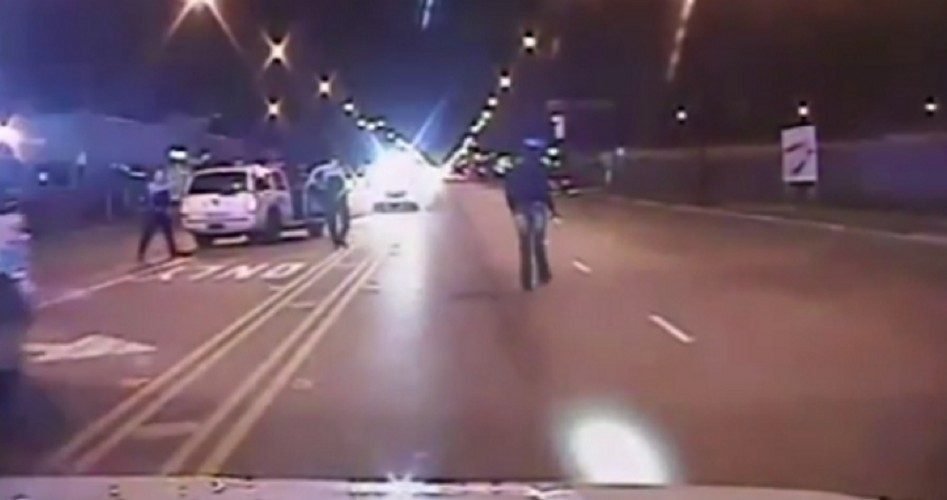
More than a million people have seen the dashcam video of Chicago Police Officer Jason Van Dyke gunning down Laquan McDonald on the night of October 20, 2014. But for the efforts of a freelance journalist no one would have seen it — ever.
When Brandon Smith, a Chicago freelance journalist, learned that 15 requests to release the video had been denied by Mayor Emanuel’s administration, he filed suit on August 5 to force its release. Two days later Smith explained why:
On Wednesday, I filed suit against the Chicago Police Department because of its refusal to release the police car dashboard camera video that shows an officer fatally shooting Laquan McDonald on the city’s southwest side last fall. The 17-year-old was shot 16 times, according to an autopsy conducted by the Cook County Medical Examiner’s Office.
On the night of the shooting, October 20, police received a report of a man breaking into vehicles in the Archer Heights neighborhood. Responding officers allege McDonald was carrying a knife he was using to stab tires, that the teen posed “a very serious threat,” that they ordered McDonald to drop the knife, and that he reacted by lunging at the officers.
The rest, it is said, is history. Illinois Attorney General Lisa Madigan wrote a letter to the Chicago Police Department (CPD), stating that they could no longer withhold the video from the public and that their claims that its release would “interfere” with an ongoing investigation were “unsubstantiated.” Emanuel’s administration asked for a stay, which was denied by Cook County Judge Franklin Valderrama. The judge then ordered the city to release the video no later than November 25.
On November 24, the video was released, setting off a domino effect that now threatens to end Emanuel’s mayorship, along with his political career.
On the day the video was released, Cook County State Attorney Anita Alvarez charged Van Dyke with first-degree murder, 13 months after the incident. A conviction would send Van Dyke to jail for 20 years to life.
Protests mounted following the release of the video, with Michigan Avenue, the main thoroughfare through downtown Chicago, being shut down for hours. The protests continued through Black Friday. Riots resulted in dozens being arrested, causing Emanuel’s poll numbers to sink to just 18 percent, with more than half of Chicago residents being polled demanding his resignation.
On Wednesday Emanuel gave a 40-minute speech in front of the Chicago City Council, alternately grieving and then claiming that he and the CPD would be turning over a new leaf. He fired the police chief and said he was setting up a task force to review police accountability while searching for a new police superintendent.
It may be too little, too late. The day after the dashcam video was released, the Washington Post brutally exposed the corruption that goes from the police department to the very top of Emanuel’s administration. Wrote the Post’s editorial board:
The problem starts in the mayor’s office; implicates the police department’s top brass, the police union and rank-and-file officers; and runs through the city’s nominally independent police review authority, which routinely dismisses allegations of police wrongdoing.
Since 2007, the authority has reviewed nearly 400 police-involved shootings in Chicago, fatal and non-fatal — an average of about one per week — and judged just one of them to be unjustified. Just one officer was charged criminally in all those shootings, and he was acquitted.
And as far as Jason Van Dyke is concerned, the Post exposed his long record of misconduct:
At least 15 misconduct complaints had been lodged against Mr. Van Dyke over the years, none of which resulted in disciplinary action. In the decade ending in 2014, the city is estimated to have spent $500 million settling legal claims arising from police misconduct; that was before it paid $5 million to Mr.McDonald’s family this year.
Vanessa Williamson, a fellow at the Brookings Institute, thinks that Emanuel’s career is all but over. Used to going on the offensive (in all senses of that word) while serving as President Obama’s chief of staff, Emanuel is perhaps best known for telling the Wall Street Journal at the start of the Great Recession, “You never want a serious crisis to go to waste.… This crisis provides the opportunity for us to do things that you could not [do] before.”
Now, the crisis centers around Emanuel himself, and he is running out of options. Firing more people, blaming others for the corruption he himself has overseen, giving more speeches (tears included), hosting more roundtable discussions and even inviting the FBI in to do a separate investigation, all seem, to Williamson, to be political maneuvering and posturing: “There may be some brilliant political play here, but I think the time of political plays has passed.”
And all because Brandon Smith, an independent investigative journalist, simply wouldn’t give up.
A graduate of an Ivy League school and a former investment advisor, Bob is a regular contributor to The New American magazine and blogs frequently at LightFromTheRight.com, primarily on economics and politics. He can be reached at [email protected].
Related article:
Chicago Mayor Apologizes Amid Demands for Resignation



